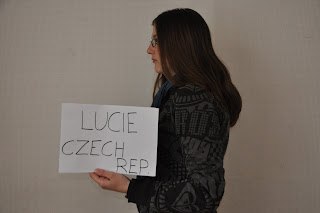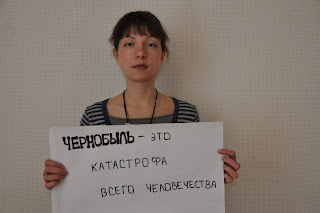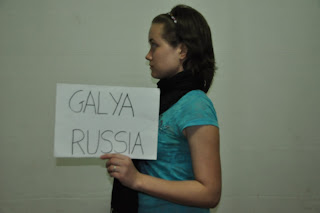Myth Chernobyl
25 years passed...but what is left? What do you know about April 26, 1986. It was the day of the nuclear melt down in Bloc 4 of the Chernobyl nuclear power plant. It was a day a nuclear cloud spreading radioactive particles started its journey over wide parts of Central and Eastern Europe. 25 years after this disaster: What is left? We can book trips to Pripyat which was discovered as a touristic attraction and we can get all information about the event in the internet. But how do we see it? Myth Chernobyl is a youth exchange in which young people from 5 countries met and discussed these topics.
Thursday, April 28, 2011
Friday, April 22, 2011
What we think and feel about Chernobyl
“thanks to chernobyl, I understood power can be poison”
Jana Maleckova, 27, Czech Republic
“after chernobyl, it's impossible to trust”
Joksie Biesemans, 24, Belgium
“after chernobyl, I understood that murphy's law fits everywhere: whatever can go wrong, will go wrong”
Gabri, 22, Czech Republic
“thanks to chernobyl, I wondered why people accept everything and that we can’t run away”
Gesine Kallert, 21, Germany
“after chernobyl, it is impossible to continue like before”
Ekaterina Yakushina, 22, Russia
“thanks to chernobyl, I understood that humans are not able to rule the world and that they can't control the power of nature and technology”
Yaroslava Yakovleva, 21, Ukraine
“thanks to chernobyl, I understood that people become one”
Riet Aerts, 26, Belgium
“after chernobyl, it is impossible to ignore our duty to preserve our earth”
Sylvie Peeters, 24, Belgium
“after chernobyl, it's impossible not to think about alternative energy”
Kim Devoldere, 21, Belgium
“after chernobyl, it's impossible to be indifferent
to continue to destroy ourselves
to be unconscious
not to take care of people's lifes
to think only about today
not to be responsible
but we still do the impossible”
Evgenia Sviridova, 22, Ukraine
“thanks to chernobyl, I understood that there are no borders for radiation, air and water”
Alexey Karachinskiy, 25, Russia
“thanks to chernobyl, I understood that life is too expensive to pay for mistakes of other people”
Evgenia Federova, 23, Russia
“after chernobyl, it's impossible to hope for the best future”
Galyna Yakushina, 22, Russia
“thanks to chernobyl, I understood that every technology in human hands can be dangerous”
Lucie Kubelova, 24, Czech Republic
“after chernobyl, it's impossible to continue living our lifes like before without paying the bill”
Rada Konstantinova, 21, Russia
“thanks to chernobyl, I understood that change has to be selfmade”
Katja Hildmann, 20, Germany
“chernobyl makes me feel chaotic”
Linda Palenikova, 21, Czech Republic
“chernobyl makes me sad”
Frank Rochow, 25, Germany
“chernobyl makes me sad
chernobyl makes me think
chernobyl makes me react”
Mariia Servetnyk, 22, Ukraine
“chernobyl accident showed, that people are sad wankers, who don't study on their mistakes”
Vnukova Liza, 20, Ukraine
The Group
Russians:
Alexey Karatchinskij
Galyna Yakushina
Evgenia Fedorova
Natalya Belokopytova
Rada Konstantinova
Ukainians:
Liza Vnukova
Mariia Pisklova
Mariia Servetnyk
Frank Rochow
Evgenia Sviridova
Belgians:
Sylvie Peeters
Els ‘Joksie’ Biesemans
Riet Aerts
Kim Devoldere
Katrien Delille
Germans:
Gesine Kallert
Katja Hildmann
Elisabeth Wachter
Czechs:
Linda Páleníková
Lucie Kubelova
The Program
2011 has one special date – 25th anniversary of Chernobyl disaster which we do not want to leave without attention. Together with our partner organization, association of graphic designers "4th block", we propose to celebrate the 25th anniversary by addressing what is Myth Chernobyl – through the eyes of young people born after the accident, how they see and understand it.
The youth exchange will bring together 25 young people f...rom 5 countries and partner organizations such as SVIT-Ukraine, Ecocenter Zapovednics Russia, Duha Czech Republic, VIA Belgium and SCI Germany.
Aims of the project are:
- to facilitate an exchange among the participants, what Myth Chernobyl and Chernobyl accident, mean for them, as seen by the eyes of young people born after the disaster
- to raise the awareness of the participants in international and European context on energy issues, climate change, environmental sustainability issues and European energy policy
- to discuss links between energy issues and active citizenship - on examples of Chernobyl accident and other and how people can influence energy policy in their countries.
Activities:
- Creating 2 models of the 4th reactor of Chernobyl nuclear power plant, collecting materials to fulfill the reactors – pictures, posters and statements, work on concept and design of the exhibition. One model of reactor will be filled with visual materials presenting Chernobyl accident as history – mostly photos made during the liquidation works at the Nuclear Power Plant and exclusion zone around Chernobyl from the collection of “4block”. The second model will reflect the Myth Chernobyl as seen with the eyes of young generation – visual materials developed by the participants, statements about the accident and other.
- Discussions and exchange within the group about Chernobyl disaster, what and how young people born during 25 years since the accident see and understand it, what it is for them nowadays – regarding use of energy, energy sources, environmental issues, climate change, health and other issues.
- Exhibition of the model and of posters by "4th block" dedicated to the accident. The participants will also have discussions with visitors and guest speakers who will come to the exhibition
- Creating a brochure and on-line platform dedicated to Myth Chernobyl where outcomes and visual materials of the project will be visible for others
- Excursions to the memorial places and intercultural evenings which will provide space for the participants to exchange and interact in informal way
The youth exchange will bring together 25 young people f...rom 5 countries and partner organizations such as SVIT-Ukraine, Ecocenter Zapovednics Russia, Duha Czech Republic, VIA Belgium and SCI Germany.
Aims of the project are:
- to facilitate an exchange among the participants, what Myth Chernobyl and Chernobyl accident, mean for them, as seen by the eyes of young people born after the disaster
- to raise the awareness of the participants in international and European context on energy issues, climate change, environmental sustainability issues and European energy policy
- to discuss links between energy issues and active citizenship - on examples of Chernobyl accident and other and how people can influence energy policy in their countries.
Activities:
- Creating 2 models of the 4th reactor of Chernobyl nuclear power plant, collecting materials to fulfill the reactors – pictures, posters and statements, work on concept and design of the exhibition. One model of reactor will be filled with visual materials presenting Chernobyl accident as history – mostly photos made during the liquidation works at the Nuclear Power Plant and exclusion zone around Chernobyl from the collection of “4block”. The second model will reflect the Myth Chernobyl as seen with the eyes of young generation – visual materials developed by the participants, statements about the accident and other.
- Discussions and exchange within the group about Chernobyl disaster, what and how young people born during 25 years since the accident see and understand it, what it is for them nowadays – regarding use of energy, energy sources, environmental issues, climate change, health and other issues.
- Exhibition of the model and of posters by "4th block" dedicated to the accident. The participants will also have discussions with visitors and guest speakers who will come to the exhibition
- Creating a brochure and on-line platform dedicated to Myth Chernobyl where outcomes and visual materials of the project will be visible for others
- Excursions to the memorial places and intercultural evenings which will provide space for the participants to exchange and interact in informal way
Subscribe to:
Comments (Atom)









































